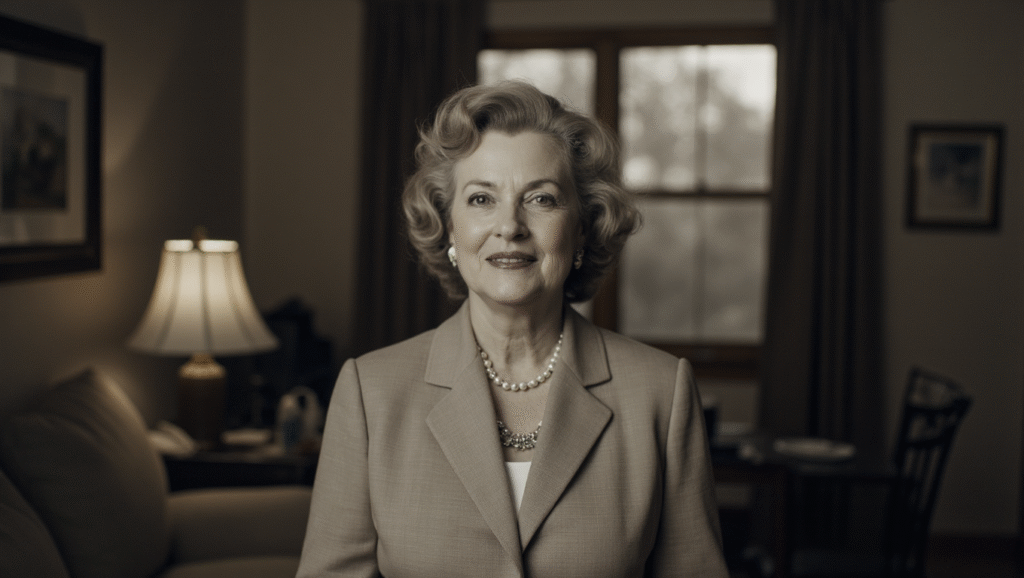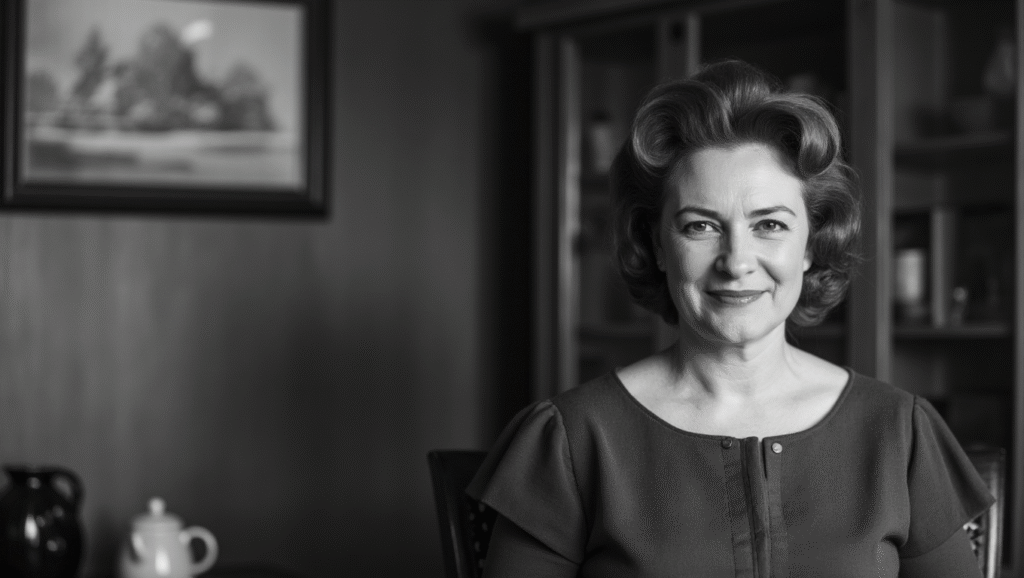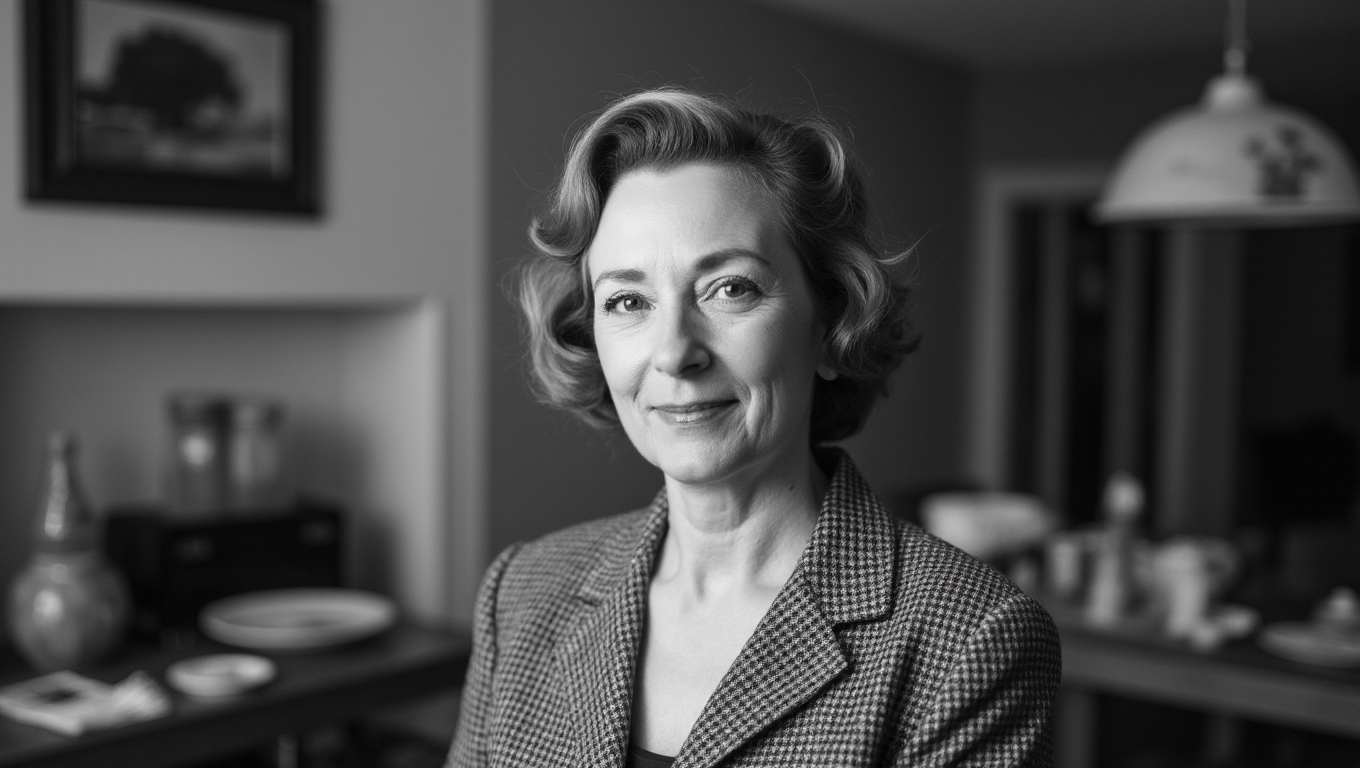Marilyn Janet Kroc Barg (October 15, 1924 – September 11, 1973) remains one of the most intriguing yet understated figures in twentieth-century American history. As the only daughter of Ray Kroc, the visionary founder of McDonald’s Corporation, Marilyn lived quietly in the shadow of a global brand that redefined modern dining. Yet her life represents more than inheritance; it reflects compassion, perseverance, and the quiet strength behind a monumental business empire.
Quick View — Marilyn Kroc Barg Biography
| Full Name | Marilyn Janet Kroc Barg |
|---|---|
| Also Known As | Marilyn Lynn Kroc Barg |
| Date of Birth | October 15, 1924 |
| Place of Birth | Chicago, Illinois, USA |
| Date of Death | September 11, 1973 (age 48) |
| Place of Death | Arlington Heights, Cook County, Illinois, USA |
| Father | Ray Kroc – Founder of McDonald’s Corporation |
| Mother | Ethel Janet Fleming – Former Actress |
| First Husband | Sylvester Nordly Nelson (m. 1949 – div.) |
| Second Husband | Walter James Barg (m. 1960 – 1973) |
| Children | No public record available |
| Education | Not documented / No verified records |
| Occupation | Philanthropist / Private Citizen |
| Net Worth | Undisclosed – No official public estimate |
| Cause of Death | Complications from Diabetes |
| Resting Place | Arlington Heights, Illinois (Private Family Burial) |
| Known For | Daughter of Ray Kroc and early influence in Kroc family philanthropy |
| Nationality | American |
Early Life and Family Heritage
Born in Chicago, Illinois, Marilyn grew up during the Great Depression in a middle-class household that valued discipline, hard work, and self-belief. Her father, Ray Kroc, was still years away from discovering the McDonald brothers’ small hamburger stand that would one day revolutionize fast food. Her mother, Ethel Janet Fleming, a former film actress, brought artistic sensitivity and emotional warmth to the family environment.
Marilyn’s upbringing combined modest beginnings with an expanding sense of ambition. Family friends described her as reserved, thoughtful, and keenly observant traits that mirrored her father’s intensity but were tempered by her mother’s empathy. The Kroc family lived through economic struggle long before McDonald’s became a household name, shaping Marilyn’s values around gratitude and resilience.
Education and Formative Influences
Details about Marilyn Kroc Barg’s formal education remain limited, but she received a conventional mid-century schooling that encouraged civic participation and community service. Growing up in the urban heart of America’s industrial Midwest exposed her to both the opportunities and inequalities of the period. This early awareness later informed her discreet involvement in philanthropic causes a thread connecting her life to the broader narrative of Kroc family philanthropy.
Personal Life and Marriages
Marilyn’s adult life unfolded away from the public spotlight. She married Sylvester Nordly Nelson, a World War II veteran, in 1949. The marriage ended amicably after several years. In 1960, she wed Walter James Barg, whose steady nature complemented her preference for privacy and domestic normalcy. The couple lived primarily in the Chicago suburbs, maintaining a life of modest comfort despite her father’s emerging wealth.
Unlike many heirs of business dynasties, Marilyn consciously avoided celebrity culture. She valued relationships, health, and social responsibility over material excess. Friends often noted that she disliked being identified solely as “Ray Kroc’s daughter,” preferring to cultivate her own identity as an independent, empathetic individual.
Relationship with Her Father
Although the public often associates Ray Kroc with ambition and relentless business drive, his relationship with Marilyn was marked by mutual respect and affection. He viewed her as a grounding presence during his early entrepreneurial years. As the McDonald’s franchise expanded, their relationship evolved under the weight of fame, but correspondence and family accounts suggest continued emotional closeness.
Marilyn’s pragmatic outlook often balanced her father’s intensity. She reportedly supported his later-life philanthropic pursuits and encouraged his belief that wealth should benefit communities a principle later embodied in the Ronald McDonald House Charities (RMHC) established after Ray’s passing.
Health Struggles and Resilience

Marilyn Kroc Barg faced chronic health challenges, notably diabetes, which shaped much of her later life. The disease limited her public activity but deepened her empathy toward others facing long-term illnesses. She became quietly involved in local health awareness programs and supported early research organizations dedicated to diabetes care.
Those close to her recall that she managed her condition with dignity, refusing to let it define her. Her perseverance under illness reflected the same resilience that characterized the Kroc family ethos steadfast discipline, quiet endurance, and compassion for those less fortunate.
Philanthropic Interests and Civic Contributions
While Marilyn never sought formal public recognition, she contributed time and resources to small-scale charitable projects in Arlington Heights and Chicago. Her interests included children’s healthcare, educational outreach, and animal welfare causes that mirrored the emerging mid-century movement toward socially responsible giving.
Though much of her philanthropy was personal and undocumented, her influence resonated through family networks that later shaped major charitable organizations linked to McDonald’s global success. Her belief that wealth carried moral responsibility influenced not only her father’s later outlook but also the philanthropic culture that now defines the McDonald’s brand legacy.
Life Philosophy and Character
Observers described Marilyn as private but deeply principled. She combined her father’s entrepreneurial discipline with her mother’s artistic empathy, creating a personality that valued sincerity over spectacle. In a society that often measured worth through visibility, she demonstrated that quiet influence could be equally transformative.
Her approach to life echoed a timeless principle: leadership without ego. She neither pursued fame nor distanced herself from her family heritage; instead, she integrated both worlds, embodying humility amid privilege.
Death and Legacy
Marilyn Kroc Barg passed away on September 11, 1973, in Arlington Heights, Illinois, at the age of forty-eight. Her death from complications related to diabetes preceded her father’s by eleven years. She was laid to rest in a private ceremony attended by close relatives and lifelong friends.
Though her life ended prematurely, Marilyn’s quiet dignity and compassion left an imprint on everyone who knew her. She symbolizes a generation of American women who lived between traditional roles and modern independence shaping family, community, and philanthropy with understated grace.
Legacy Within the McDonald’s Family Narrative

The Kroc family story is often told through the lens of corporate achievement, but Marilyn’s chapter adds emotional balance to that narrative. Her existence bridges the entrepreneurial vigor of her father and the later humanitarian vision represented by the Kroc foundations. She stands as the connective figure linking business innovation with human empathy.
Marilyn’s life underscores that every great empire relies not only on public figures but also on those who nurture values behind the scenes. Her commitment to compassion helped form the moral undercurrent of the McDonald’s family legacy service, community, and care for others.
Lessons from Marilyn Kroc Barg’s Life
- Legacy Is Broader Than Wealth: Marilyn proved that the worth of a family name lies in its actions, not its fortune.
- Philanthropy Begins with Empathy: Her quiet giving reflected genuine concern rather than public obligation.
- Resilience Defines Character: Her courage against illness and obscurity mirrors the enduring spirit behind McDonald’s rise.
Conclusion
Marilyn Kroc Barg may never have sought the spotlight, but her influence illuminates the human side of a corporate legacy. Through humility, empathy, and an unspoken commitment to others, she exemplified the strength that sustains great families and institutions. Her life invites reflection on how integrity and kindness can shape reputations as enduringly as innovation or enterprise.
In remembering her, we see not only the daughter of a global icon but also a woman who defined her own quiet revolution proof that compassion can be as powerful as ambition in leaving a lasting mark on history.
FAQ’s
Q1. Who was Marilyn Kroc Barg?
Marilyn Kroc Barg was the only daughter of Ray Kroc, founder of the McDonald’s Corporation, and his first wife, Ethel Janet Fleming. She lived a private, compassionate life centered around philanthropy and family, away from the public eye.
Q2. When and where was Marilyn Kroc Barg born?
She was born on October 15, 1924, in Chicago, Illinois, United States.
Q3. Who were Marilyn Kroc Barg’s parents?
Her father was Ray Kroc the visionary who transformed McDonald’s into a global brand — and her mother was Ethel Janet Fleming, a former actress from New York.
Q4. Did Ray and Ethel Kroc have children?
Yes. Marilyn Kroc Barg was the only child of Ray Kroc and Ethel Janet Fleming. The couple had no other children together.
Q5. What was Marilyn Kroc Barg famous for?
She is known primarily as the daughter of McDonald’s founder Ray Kroc. However, she was also recognized for her quiet involvement in early Kroc family philanthropy and her dedication to charitable causes, including children’s health and diabetes awareness.
Q6. Did Marilyn Kroc Barg work at McDonald’s?
There is no verified record of her holding an official role within McDonald’s. She preferred to live privately and contribute to community welfare through personal initiatives rather than corporate involvement.
Q7. What happened to Marilyn Kroc Barg?
Marilyn Kroc Barg passed away on September 11, 1973, in Arlington Heights, Illinois, at the age of 48, due to complications from diabetes. Her death occurred several years before her father’s passing in 1984.
Q8. Who was Marilyn Kroc Barg married to?
She married Sylvester Nordly Nelson in 1949 (later divorced), and then Walter James Barg in 1960. Her second marriage lasted until her death in 1973.
Q9. What happened to Ray Kroc’s first wife, Ethel Janet Fleming?
Ethel Janet Fleming, Ray Kroc’s first wife and Marilyn’s mother, was a silent film actress during the 1910s and early 1920s. She later lived a private life after her separation from Ray Kroc in the 1960s and passed away in 1965.
Q10. What was Marilyn Kroc Barg’s net worth?
Her individual net worth was never disclosed. While she inherited wealth through the Kroc family, there are no official records or estate filings detailing her personal finances.
Q11. Where is Marilyn Kroc Barg buried?
She was laid to rest in a private family burial in Arlington Heights, Illinois, USA.
Q12. What is Marilyn Kroc Barg’s lasting legacy?
Marilyn is remembered for her humility, kindness, and contributions to the early charitable values that shaped the Kroc family legacy. Her influence foreshadowed the later creation of the Ronald McDonald House Charities, which continues to serve families worldwide.





